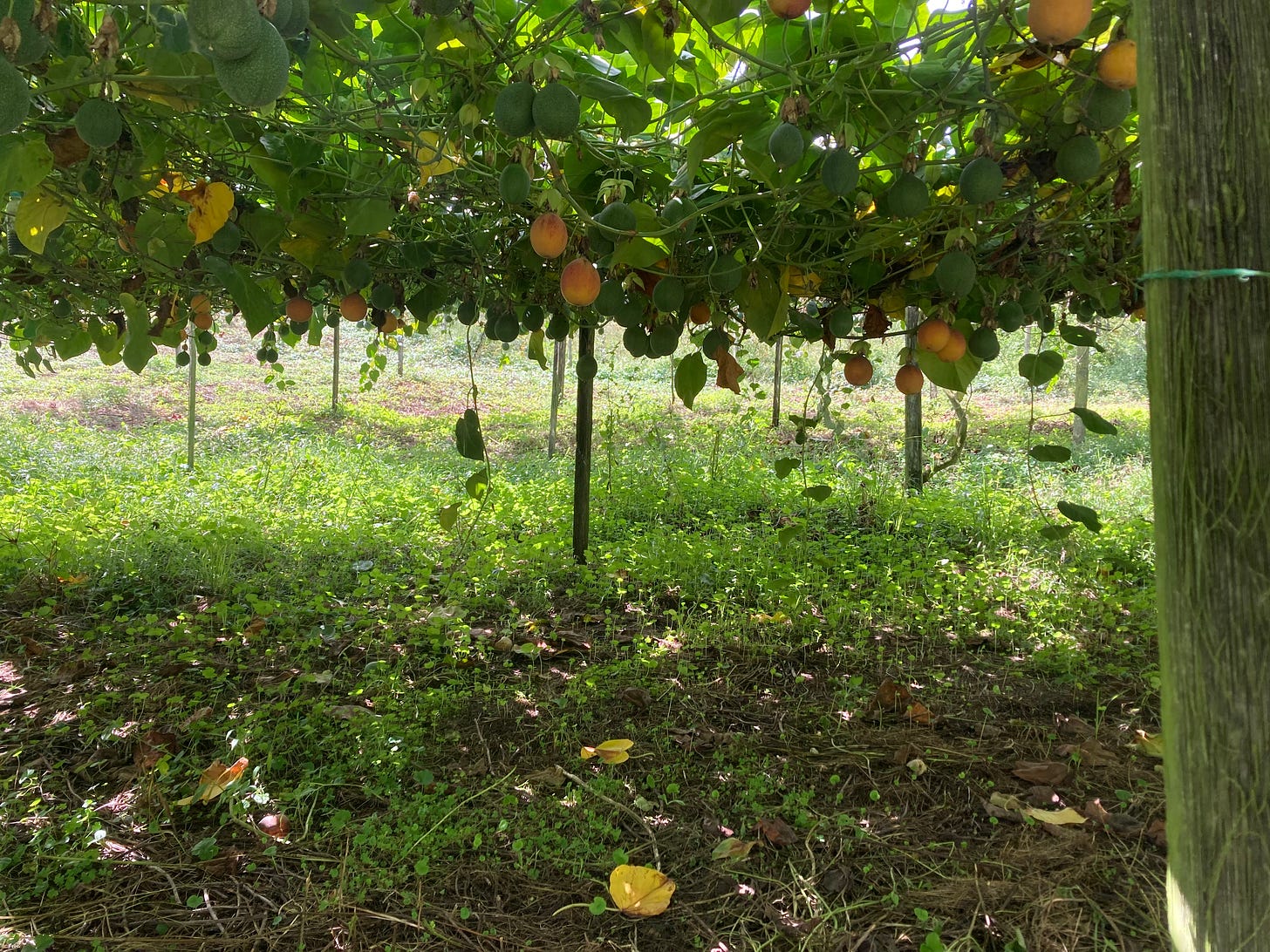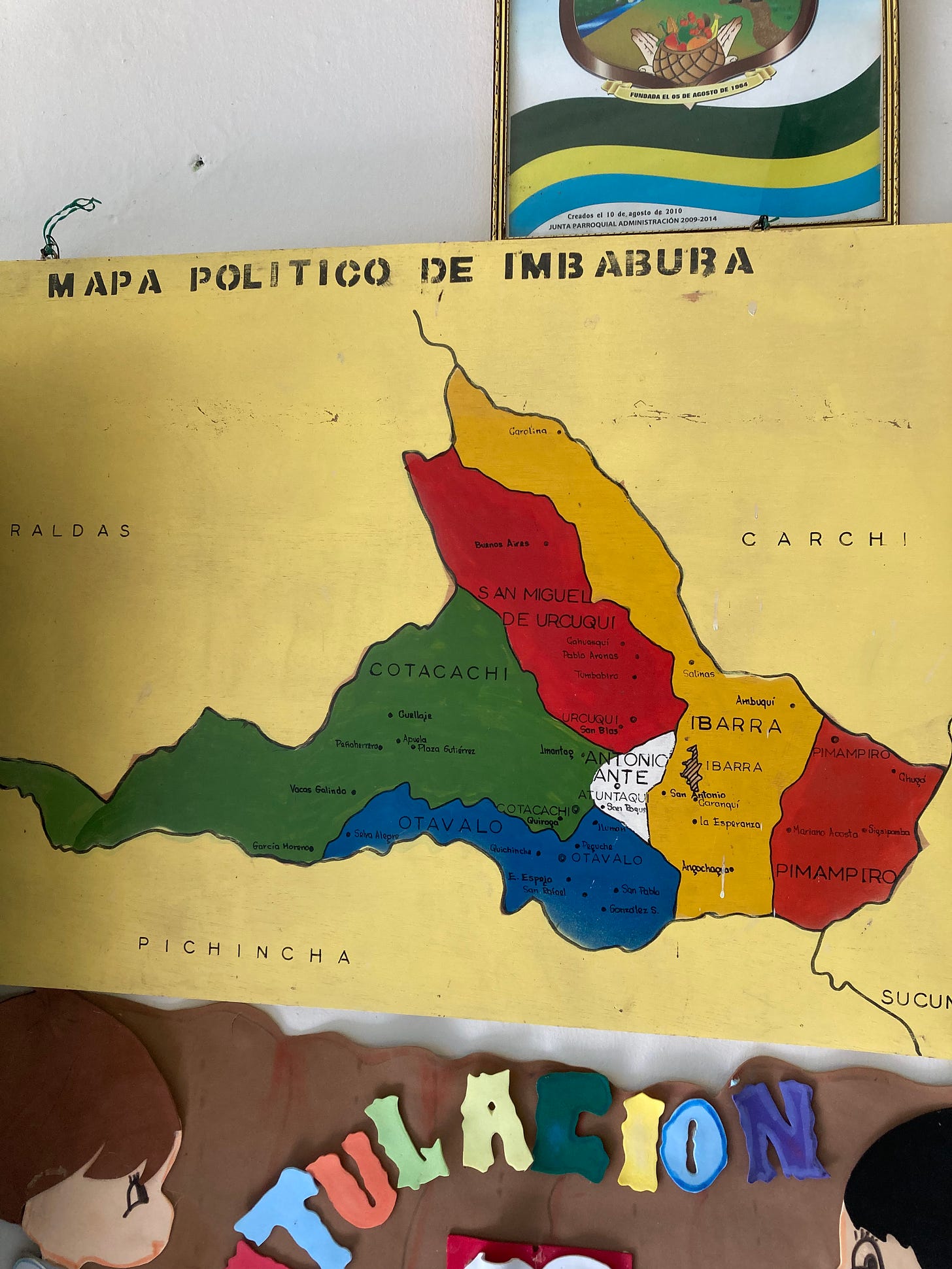June 4
I made it to El Rosario today, my final destination. It’s a rural community—a.k.a. a cluster of farms and a school—about 45 minutes north of Cuellaje by bus. Before that, I worked with Patricia a bit in her plot of land on the mountain by the pigs. We worked the hard land with a hoe and scattered bean seeds. It was cooler today and rained a lot. We had lentils, rice, sardines, yuca fries, tomatoes, and avocado for lunch with Ned. I shelled beans for a bit, and then it was time to wait in the town square for the bus to come. It came late, and I was worried I’d have to take a camioneta (which would have cost $15, leaving me without enough to take the bus to Otavalo on Saturday, which I needed to do to get cash to pay my host family). The bus came, but initially the bus driver said they wouldn’t continue on to El Rosario due to the rain. Ned convinced him to take me anyway. There was just me and one other guy on the bus. Driving a greyhound-style coach through the Ecuadorian tropical montane cloud forest is a serious endeavour. After about 45 minutes, we came upon a dead end by someone’s farm. There were chickens running around everywhere. As we did a one-million-point turn, a guy poked his head in the door and asked if I was the volunteer Ned had sent. It turned out this guy, Ramiro, was the father of the family I would be staying with.
We walked together along the muddy road to his farm. He narrated the walk by pointing out different fruits and asking whether I had them in my country. Avacado? Yes, it’s very expensive in Canada. Tomate de arbol? No. Orange? Yes. Grenadilla? No. Guanabana? No. Banana? Yes.

At the farm, I met some other family members and friends. Ramiro’s wife is named Alva, his son Stalin, and his friend Guido. I also met Guido’s son, who was also named Guido). We fed the chickens and pigs, and he told me about his farm and his family. It’s surrounded by idyllic, paradise-like scenery that’s at once arcadian and fascinatingly strange (all the plants are foreign to me).
I had soup, and Ramrio told me about all the duck species around here. I have my own room, with a nice bed that’s even more comfortable than my bed in Montreal. I’ve got to get up at 6:15 so I can eat breakfast before going to the school to teach English.
The above panoramic video was taken from the farm. The bright green plants are all beans.
June 5
I got up at 6:00 am today, had breakfast, and walked with Alva down to the school. We got there super early, and the teacher and kids didn’t arrive until around 8:00. The teacher has her hands full, with around 16 students (which is not too bad), but they’re all in different grades. Teaching them together is impossible.
She didn’t really explain to me what to do, but I was told to take groups of students one at a time to a different room where I’d teach them English. For the youngest kids, I tried to teach them “hi,” “hello,” “bye,” and “my name is.” That proved quite difficult, so instead we drew chickens and cows and I taught them those words. The teacher was unhappy about this because I was supposed to stick strictly to the curriculum. So with the next three groups I taught only salutations and very basic phrases. Apparently I’m supposed to play games and sign songs with the little kids, but I have no idea what kinds of games and songs I could do in English.

I came home with Mayra, a girl from the school—rather, she followed me back to the farm (it turns out Mayra is Guido’s daughter). She and I had lunch (fried trout and yuca), and then we played a game where I had to guess the colour of the thing she was hiding behind her back. We did this for a while—in both English and Spanish—and then I took a nap. Then I had dinner and watched an episode of the Nonzero podcast in which Bob Wright talked to a woman from the Quincy Institute about the military industrial complex.
June 6
School was much better today. I played outside with the kids, which helped a lot. They get distracted sitting inside after a while. Things are just getting smoother. After school, I came home to eat and rest (for lunch there was chicken in a tomato sauce, fried bananas, yuca, rice, and avocado), and then walked all around the area surrounding the farm. I went up the hill from the farm to get a good view of the whole valley. I couldn’t figure out how to get to the top of the ridge without walking through crops or trespassing. I then walked down to the river, crossed the bridge, and explored the other side of the valley for a while. I went back to the kitchen and hung out with Ramiro (the eldest of the four sons) for a bit. (The other sons are named Edgar, Lenin, and Stalin.) Ramiro speaks good English, which he learned from this Alaskan woman who spends a few months of the year in the farm next door. Then I hung out with Ramrio the dad and Alva for a while and they told me about the animals that come eat their food and crops (bears and squirrels). Then I watched some Bob Wright stuff. Still haven’t done much reading
June 7
There was no English class today, so I just sat around and read my book (IQ84) and the Economist. I helped out a little bit, whenever I could. I walked home with Luis and Mayra, two kids from the school. I had pork and tortillas for lunch (remember, tortillas hear are actually fried balls of yuca and cheese), and then helped Alva and Guido shell fréjoles. Then I walked along the road back toward the school and beyond listening to Tyler Cowan interview Raj Chetty. That evening I rewatched the first episode of Narcos.








